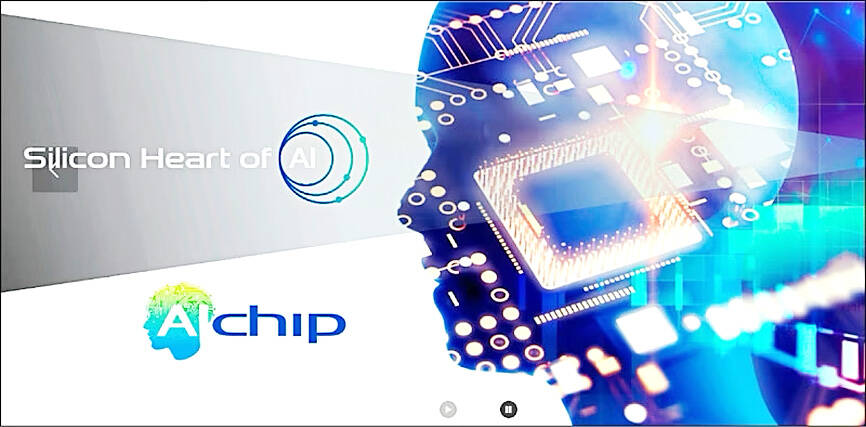Artificial intelligence (AI) chip designer Alchip Technologies Ltd (世芯) yesterday said that revenue and net profit this quarter would surpass a record-high performance in the second quarter, thanks to increasingly stable supply of advanced chip-on-wafer-on-substrate (CoWoS) packaging capacity and new orders.
The Taipei-based company gave a bullish view about next year’s revenue growth momentum, benefiting from a growing trend that cloud service providers intend to make their own AI chips to provide differentiated services.
The company said its confidence is built on strong demand as multiple North-America-based customers are to see their new AI chips entering volume production from next year, chief executive officer Johnny Shen (沈翔霖) told investors yesterday.

Photo: screen grab from the Alchip Technologies Ltd Web site
One of the customers is set to ship AI training chips made on 7-nanometer and 5-nanometer process technologies from this quarter through next year, Shen said.
“Customers’ demand for high-performance-computing [HPC] and AI applications remains robust,” Shen said. “Demand at our largest customer is increasing. Its business forecast for next year significantly surpasses this year’s figures.”
Alchip also saw orders from other customers “drastically increase,” Shen said.
“We anticipate substantial revenue growth for the next three to four quarters,” he said.
Alchip counts Amazon.com Inc and Intel Corp among its AI chip customers. Chips used in HPC, notably servers, accounted for 85 percent of the company’s revenue last quarter, up from 81 percent in the second quarter.
The firm is also making “steady progress” in boosting CoWoS packaging capacity allocations at Taiwan Semiconductor Manufacturing Co (台積電), Shen said.
“We expect smoother production of CoWoS-related products starting in the second half of this quarter,” Shen said.
Supply of CoWoS capacity is a deciding factor in the company’s revenue momentum, Alchip chief financial officer Daniel Wang (王德善) told investors.
Supply constraints of CoWoS packaging capacity was blamed for a sequential decline of 7 percent of revenue in the third quarter.
To cope with the better-than-expected demand, Alchip plans to raise US$350 million by issuing global depositary receipts (GDRs) to finance the expansion of its production lines.
The company plans to issue as many as 40 million new shares in the form of GDRs, about 5 percent of the company’s total share capital.
Addressing investors’ concern about the impact of the US’ curbs on chip exports to China, Shen said the impact would be very minimal, as the affected chips only make up a 1 or 2 percent of the company’s total revenue.
This year revenue from China would drop to less than 15 percent of total revenue, Shen said.
Alchip yesterday reported a net profit of NT$28.09 billion (US$868 million) for the third quarter, a 93 percent year-on-year increase, thanks to robust demand for chips used in servers.
On a quarterly basis, net profit expanded 17.4 percent.
Gross margin improved to 23.75 percent last quarter from 21.34 percent in the second quarter, but fell from 31.7 percent in the third quarter last year.

South Korea’s equity benchmark yesterday crossed a new milestone just a month after surpassing the once-unthinkable 5,000 mark as surging global memory demand powers the country’s biggest chipmakers. The KOSPI advanced as much as 2.6 percent to a record 6,123, with Samsung Electronics Co and SK Hynix Inc each gaining more than 2 percent. With the benchmark now up 45 percent this year, South Korea’s stock market capitalization has also moved past France’s, following last month’s overtaking of Germany’s. Long overlooked by foreign funds, despite being undervalued, South Korean stocks have now emerged as clear winners in the global market. The so-called “artificial intelligence

‘SEISMIC SHIFT’: The researcher forecast there would be about 1.1 billion mobile shipments this year, down from 1.26 billion the prior year and erasing years of gains The global smartphone market is expected to contract 12.9 percent this year due to the unprecedented memorychip shortage, marking “a crisis like no other,” researcher International Data Corp (IDC) said. The new forecast, a dramatic revision down from earlier estimates, gives the latest accounting of the ongoing memory crunch that is affecting every corner of the electronics industry. The demand for advanced memory to power artificial intelligence (AI) tasks has drained global supply until well into next year and jeopardizes the business model of many smartphone makers. IDC forecast about 1.1 billion mobile shipments this year, down from 1.26 billion the prior

People stand in a Pokemon store in Tokyo on Thursday. One of the world highest-grossing franchises is celebrated its 30th anniversary yesterday.

Chinese artificial intelligence (AI) start-up DeepSeek’s (深度求索) latest AI model, set to be released as soon as next week, was trained on Nvidia Corp’s most advanced AI chip, the Blackwell, a senior official of US President Donald Trump’s administration said on Monday, in what could represent a violation of US export controls. The US believes DeepSeek will remove the technical indicators that might reveal its use of American AI chips, the official said, adding that the Blackwells are likely clustered at its data center in Inner Mongolia, an autonomous region of China. The person declined to say how the US government received